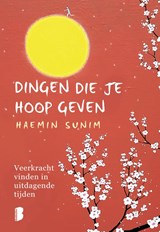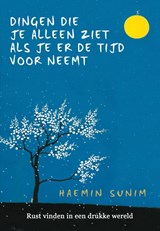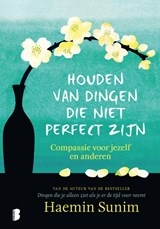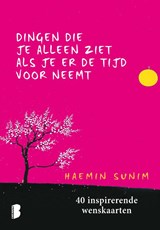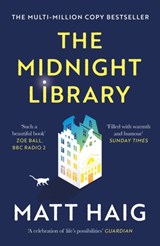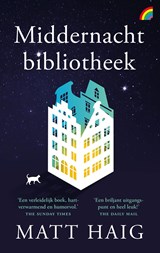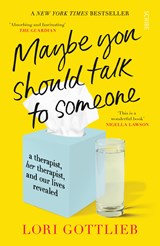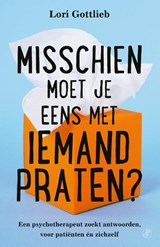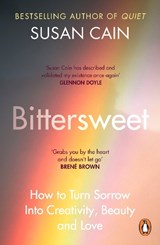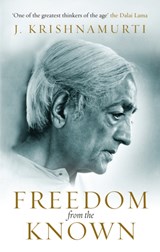5 vragen aan Haemin Sunim, schrijver van Dingen die je hoop geven
18 oktober 2023Wij verwelkomen de inspirerende boeddhistische leermeester Haemin Sunim. Ruim tien jaar na het verschijnen van zijn wereldwijde bestseller Dingen die je alleen ziet als je er de tijd voor neemt verschijnt in november zijn nieuwe boek. In Dingen die je hoop geven zoekt hij naar veerkracht in uitdagende tijden. Hij biedt onder meer lessen die helpen omgaan met perfectionisme, verwachtingen van buitenaf en het accepteren van de grillen van het lot. Zaterdag 4 november 16.00 gaat hij in de Oude Lutherse Kerk in Amsterdam in gesprek met Mischa Blok, vandaag al beantwoordt hij onze vragen, over Haig, Gottlieb en Cain, Krishnamurti, ‘gezellig’ en het EYE.
What books are on your night stand?
I must admit that it’s somewhat embarrassing, but I frequently find solace in revisiting my own books whenever I need a reminder to slow down and savor life’s offerings. The truth is, there’s often a gap between the wisdom I’ve shared in my writings and my everyday behaviors. I often grapple with feelings of being overwhelmed, frustration, and fear. However, when I immerse myself in my own words, I swiftly rediscover my inner balance. It empowers me to observe these emotions mindfully, rather than becoming completely entangled in them.
Moreover, I’ve taken great pleasure in delving into the works of other authors, including Matt Haig’s The Midnight Library, Lori Gottlieb’s Maybe You Should Talk To Someone, and Susan Cain’s recent release, Bittersweet. These three authors, in my opinion, are truly remarkable, providing profound insights into the human experience.
What book changed your life?
At the age of sixteen, I stumbled upon Freedom from the Known by Jiddu Krishnamurti. This book posed a formidable challenge to my young mind, and I grasped only about half of what the author was conveying at that time. Nevertheless, the impact of the book on me was profound as it compelled me to deeply contemplate the essence of true freedom.
As a teenager, I initially equated freedom with the ability to do whatever I pleased. Krishnamurti, on the other hand, defined it as liberation from our preconceived notions and the limitations of our existing knowledge. He asserted that genuine freedom lies in experiencing the present moment without the filter of our pre-existing understanding. When we view the present through the lens of our past, we become conditioned and, consequently, fail to authentically engage with the present moment.
To illustrate this, consider the scenario of being in love with someone. Initially, we're naturally curious about that person's current state - their well-being, lunch choices, or the books they're presently reading. However, the moment we believe we’ve exhausted our knowledge about them, our curiosity wanes. We cease to see them as they are and instead perceive them through the lens of our past experiences. In this very moment, we no longer experience the feeling of being truly seen, and as a result, love begins to wane. Therefore, I think it's crucial to question whether we am perceiving things as they truly are or predominantly through the filter of what we have already come to know.
What is your favourite Dutch word?
‘Gezellig’ happens to be my favorite Dutch word. What I appreciate about it is the absence of a direct, one-to-one translation in English. In the Netherlands, I’ve been informed that ‘gezellig’ encapsulates a rich tapestry of emotions, such as warmth, coziness, comfort, inclusion, safety, and ease.
My assistant, who happens to be Dutch, shared that he experiences a profound sense of ‘gezellig’ when he's with a close friend in a welcoming, comfortable atmosphere. I’m absolutely enamored by this concept of ‘gezellig’ and believe that the world could benefit from more occasions to embrace and foster this heartwarming feeling
What is your favourite spot in Amsterdam?
I take pleasure in ferry rides, especially when heading to the Eye Film Museum. I relish the opportunity to sit outdoors, immersing myself in the breathtaking, panoramic cityscape and waterfront views. My favorite time to go is one hour before sunset. The museum’s architectural beauty is an added bonus, and I cherish the peaceful, uncrowded ambiance it provides.
What did you enjoy most while working on this book?
Composing this book proved to be a profoundly therapeutic journey, allowing me to delve into the recesses of my mind, where I had previously hesitated or felt ashamed to venture. As the great Persian poet Rumi once mused, ‘It is the wound through which light enters you.’ Through the experience of a broken heart, we come to a profound understanding of our true selves and organically cultivate compassion for others who, like us, may be enduring challenging times. It is my heartfelt wish that my latest book not only offers solace and comfort but also instills hope and the courage to rise once more.



